
Photos by Ralph Freso / Slideshow
Near the film’s closing moments, Grand Canyon University students cheered like they were at a basketball game. But this time it was for a poem.
They cheered as Ray Anderson read “Tomorrow’s Child,” written by Glenn Thomas. Inspired by Anderson’s speech on the quest for sustainability at Interface, the flooring company that Anderson founded, Thomas wrote to future sons and daughters of the planet, a recognition that today’s actions will affect their future. Anderson read it with emotion:
“Begin I will to weigh the cost
of what I squander; what is lost
If ever I forget that you
Will someday come to live here too.”
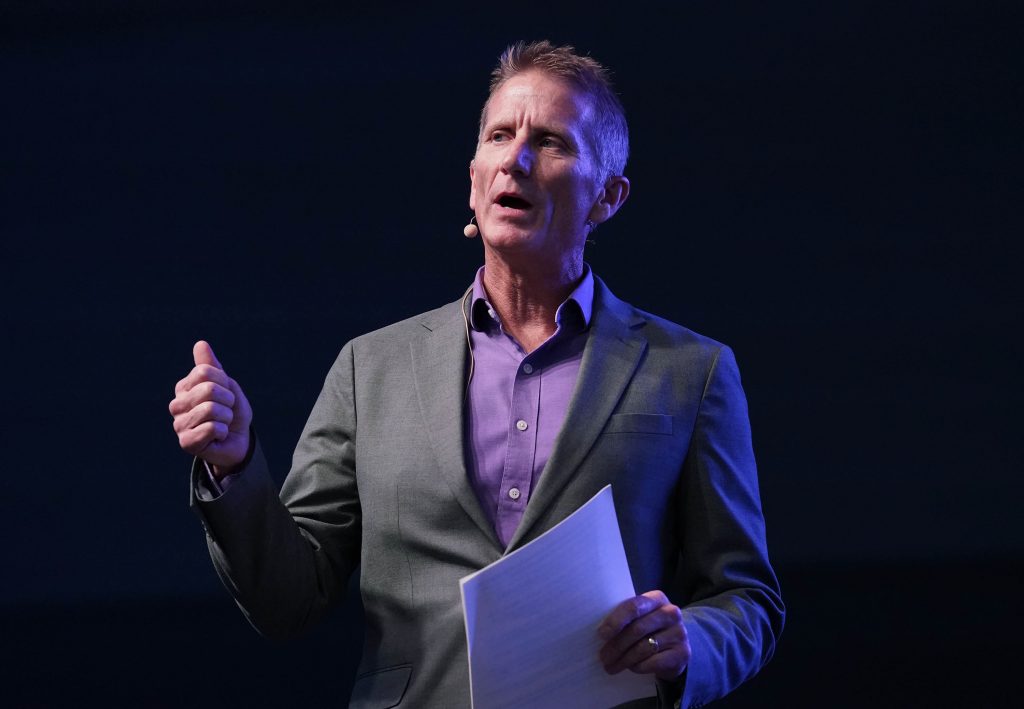
The final scenes of the documentary “Beyond Zero” were a fitting conclusion to an afternoon and evening devoted to a theme introduced by GCU Provost Dr. Randy Gibb. Business, he said, can promote humanity. It can promote human flourishing.
It can operate with financial success while serving not just shareholders but stakeholders — in Interface’s case, the planet. The company set a worldwide example for sustainability by reducing its water use 88%, its landfill waste 91% and its greenhouse gas emissions 96% while using all renewable electricity to manufacture its commercial and residential flooring, some of which now actually sequesters carbon, according to the 2020 film.
Another big name in business was on hand to introduce the film in GCU Arena before more than 2,000 attendees and in a lecture to 350 students in Sunset Auditorium earlier in the day. Bob Chapman, CEO of Barry-Wehmiller, told of other stakeholders who have driven his $3.5 billion manufacturing empire, headquartered in St. Louis: his employees.
“I believe we can love and respect the Earth and the people who are on this Earth. It’s about loving the Earth and each other in harmony,” he said. “I believe through my journey that business can be the most powerful force for good in the world if we simply cared for the people we lead and send them home each night knowing that what they do matters.”
The film detailed Anderson leading a small company to Fortune 500 by 1989 as Interface became the leading manufacturer of carpet tiles in the world. But by the mid-1990s, he had come to realize the cost to the planet of his product after reading the book “The Ecology of Commerce.”
He began seeing his product and the energy it took to produce it as pollutants on a planet rapidly facing the effects of environmental degradation and climate change. He said businesses could do something about it.
“People like us,” he said. “You and I.”
He put together an environmental “dream team” to change how his flooring was made and the energy used to make it. His financial officers and the markets were skeptical at first, but it became the company’s brand, and their innovations began to change the flooring industry.
Done right, Anderson said in the film, the old paradigm of business as solely a way to make profits could shift to doing so without sacrificing a higher purpose — creating less harm to the environment.
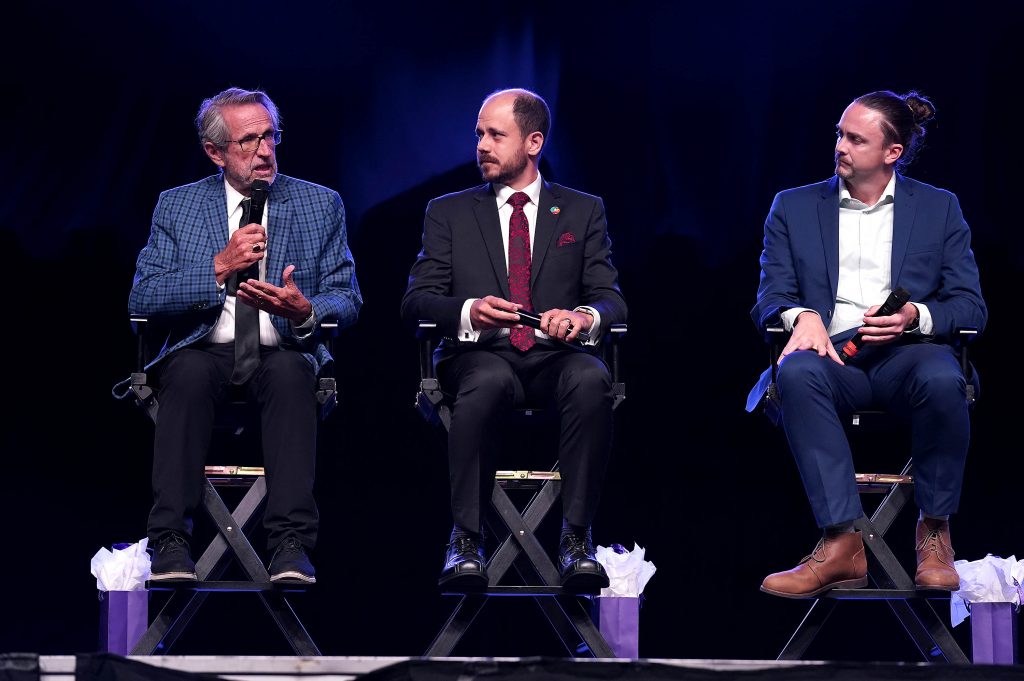
After his 2011 cancer diagnosis and death, Anderson’s legacy lived on, helped by producer and writer Nathan Havey’s film. Havey led a post-film discussion with Chapman and Interface sustainability director Joey Shea.
“Provost Gibb is one of the leading academics in the country, and maybe even the world, in trying to bring the principles of conscious capitalism into a business school education,” Havey said. “Ray Anderson had one form of conscious leadership, and Bob Chapman has another. I believe both are essential for what business needs to become to meet the challenges we face, both ecological and social.”
Gibb said later that his seven-year quest to bring Chapman to campus, combined with the film screening, showcased GCU’s integration of conscious capitalism into business curriculum.
“The movie highlights the Interface CEO’s commitment to a re-defined purpose, which galvanized the culture to one of their key stakeholders, the environment,” Gibb said. “As Ray Anderson stated, ‘Sustainability was not just the right thing to do, it was the smart thing to do for business.’ I appreciated how so much of the discussion was based on their business model, generating revenue and having the profits/abundance to reinvest into their sustainability efforts.”
He added that Chapman deftly highlighted his approach to leadership, which he defined as the “stewardship of the lives entrusted to you.”
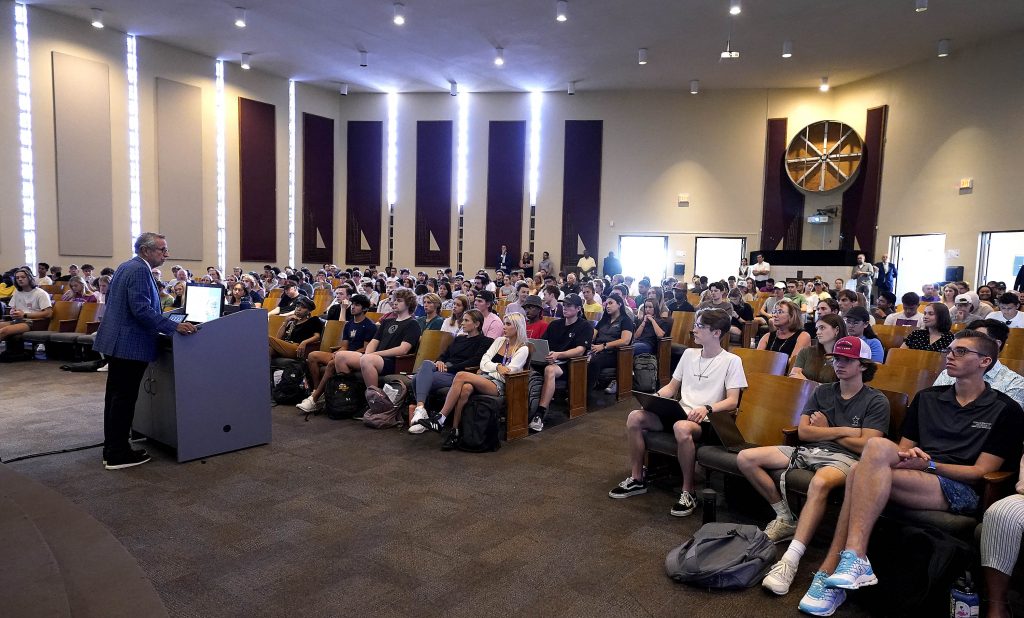
Chapman earlier told students that he once only saw employees as “objects for my success,” not as people. After a series of epiphanies, he changed his philosophy.
He witnessed employees having fun at the water cooler before work, only to take on faces of dread when they were ready to clock in. Why can’t work be fun? he asked.
At the wedding of a friend’s child, he saw the bride as her parents' “precious child” and asked why shouldn’t he view his 12,000 employees that way?
At church, he saw that once a week for an hour, a few dozen people could be inspired, and he asked why he couldn’t inspire thousands of employees when he they are with him for 40 hours a week?
Those questions and epiphanies changed everything. He went on to launch an employee-centric management philosophy, a Leadership Institute and wrote a book, “Everybody Matters.”
“When you look at people not as functions for your success but as someone’s precious child, that of those three is the one people can relate to,” he said. “So we created a vision for our company. We are guided by the way we touch the lives of people and treat them the way you like to be treated.”
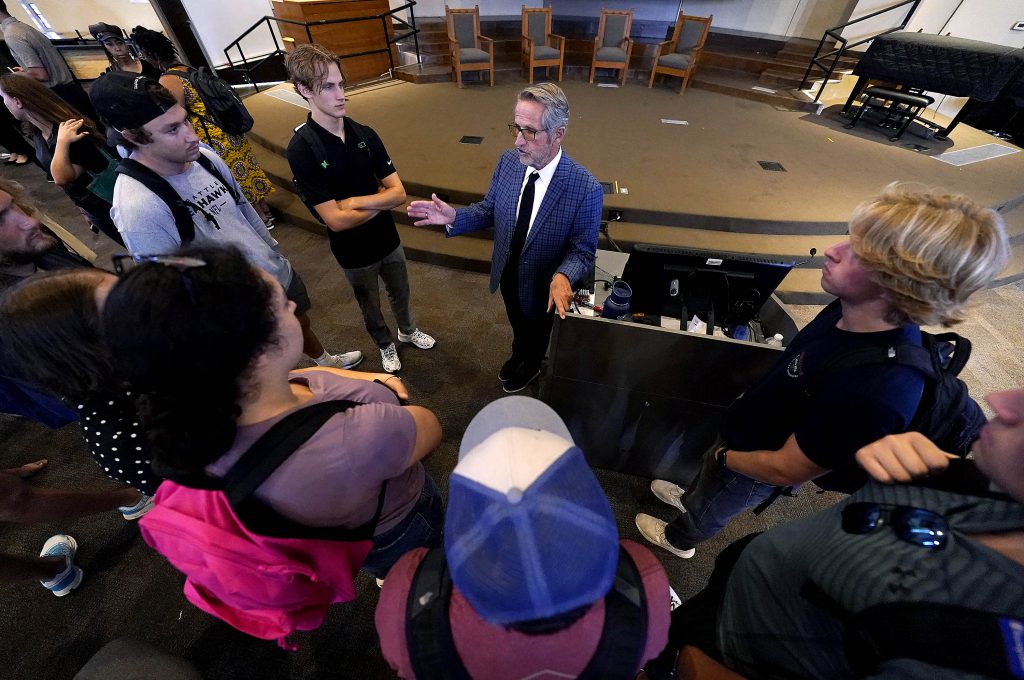
Students gathered around him after his lecture, inching closer until it was almost like a football huddle, asking how in this world of profits, in this world when people view the amount of pay as the marker of success, this philosophy could work.
Chapman, in his soft-spoken way, talked to them about the importance of first having a sound business strategy that creates a successful business as a key step to caring for employees. He told them that research shows that people care as much about finding purpose in their work as in the pay.
“Our people are our purpose,” he said. “Treat people as your precious child and you can begin healing in the world.”
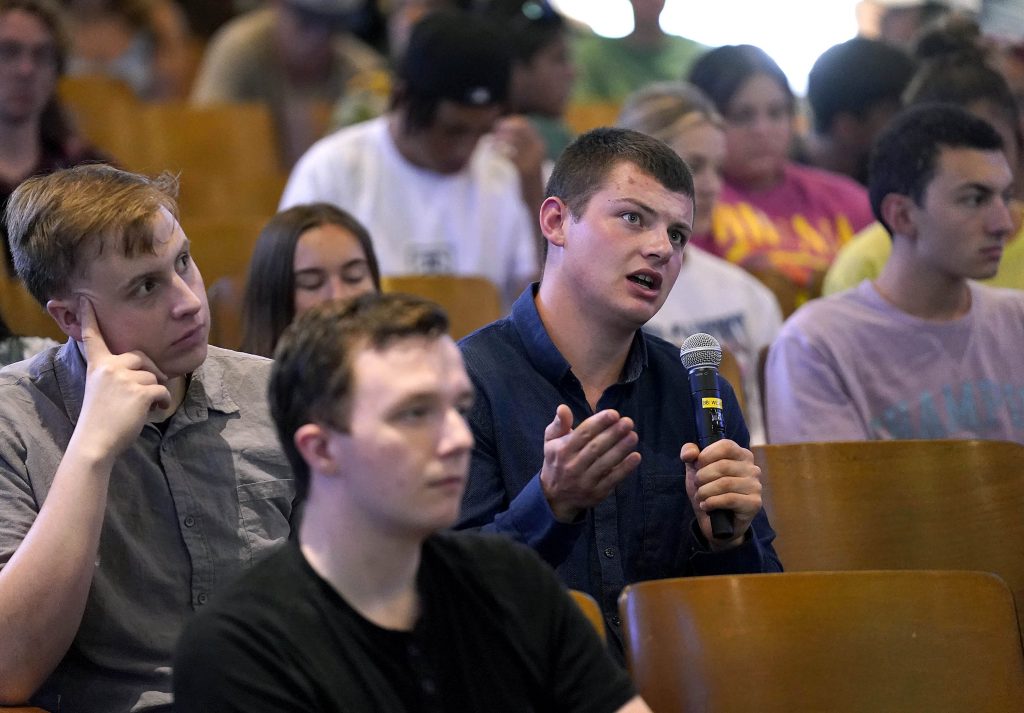
Student Stacy McMarlin-Hayes was impressed, saying his own parents run a business in Washington state under the do-as-I-say philosophy of leadership, but it was eye-opening to hear about empathic listening with employees and how that led to business success.
“I think it might be generational,” he said, saying people his age come to business with a willingness to listen and be open-minded.
Chapman agreed.
“They are more open to this than older men and women,” Chapman said afterward. “To me they are the vaccine that is going to cure this virus of self-interest. These young men and women are the injection we need in our society to create a future where human beings can be the center of our purpose.”
There is much to do, he added.
“What we have is a society stuck in an economic model where success is money, power and position, and it’s self-destructing. Why am I introducing a movie on sustainability? What good does it do to have an Earth flourishing if humans aren’t flourishing on that Earth? We need to care about the Earth, and we need to care about the people on the Earth.”
Grand Canyon University senior writer Mike Kilen can be reached at [email protected] or at 602-639-6764.
***
Related content:



































































